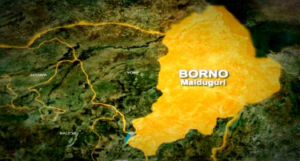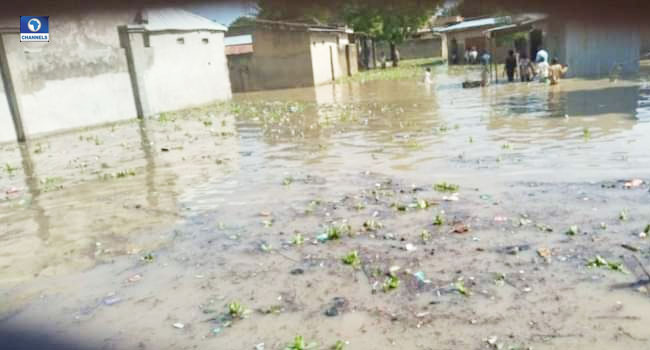The Borno State Government has announced the temporary closure of all government and private schools across the state for two weeks as a precautionary measure in response to severe flooding. This decision was made following the alarming situation brought on by excessive rainfall, which has affected communities situated along riverine and flood-prone areas. The closure was confirmed in a statement released by the Ministry of Education, Science, Technology, and Innovation on Monday, emphasizing the urgency of the matter as the floods have already started wreaking havoc in several parts of the state.
According to the statement, the closure was necessary due to the concerning condition of the Alo Dam, a critical water reservoir whose banks have suffered significant leakages. The dam, which receives water from Lake Chad, has been unable to contain the massive inflows caused by the heavy rains, leading to extensive flooding in nearby communities. This development has raised serious concerns about the safety of the dam’s surrounding areas, prompting the government to take swift action to protect lives and property.
The decision to close schools comes just a day after the start of the 2024/2025 academic session, which resumed on September 9, 2024. The Ministry of Education has stressed that the two-week break will allow the state government to better manage the flood situation and to prevent any tragic incidents involving school children or staff. The ministry also assured parents, students, and teachers that the closure is a temporary measure aimed at ensuring the safety of all those affected by the ongoing natural disaster.
 The Acting Director of Schools Services, Grema Bulama, signed the statement on behalf of the ministry, confirming that the closure was prompted by a recent inspection of the Alo Dam led by the Secretary to the State Government (SSG), Bukar Tijjani. The inspection tour was carried out on the orders of the State Governor, Professor Babagana Zulum, who had directed Tijjani to assess the true state of the dam and determine its role in the flooding that has affected the state capital and surrounding areas in past years.
The Acting Director of Schools Services, Grema Bulama, signed the statement on behalf of the ministry, confirming that the closure was prompted by a recent inspection of the Alo Dam led by the Secretary to the State Government (SSG), Bukar Tijjani. The inspection tour was carried out on the orders of the State Governor, Professor Babagana Zulum, who had directed Tijjani to assess the true state of the dam and determine its role in the flooding that has affected the state capital and surrounding areas in past years.
During the tour, it was discovered that the dam had developed multiple leakages due to the unprecedented volume of rainfall, raising fears of even more severe flooding in the days to come. The inspection team, which included top government officials and engineers, noted that immediate repairs were necessary to prevent the situation from escalating. The Alo Dam is not only a major source of water supply for the state but has also been responsible for causing flooding in previous years when it overflowed. With the rainy season now in full swing, concerns have mounted over the dam’s ability to withstand further pressure from the rising water levels.
In addition to Borno State’s precautionary measures, the statement highlighted similar challenges being faced by other states in Nigeria. Both Edo and Kano States have also announced the indefinite closure of schools, though their decisions are linked to the recent surge in fuel prices. The price of Premium Motor Spirit (PMS), commonly known as petrol, has skyrocketed in recent months, causing widespread disruptions in transportation and daily activities across the country. The fuel price hike has created additional hardships for school administrations, particularly in managing the transportation of students and staff, prompting the indefinite suspension of school operations in those states.
While the circumstances leading to the closure of schools in Edo and Kano differ from those in Borno, the common factor is the growing uncertainty facing Nigeria’s education sector. With natural disasters and economic challenges posing significant threats, state governments are being forced to make difficult decisions to ensure the safety and well-being of students and educational staff. The indefinite nature of the closures in Edo and Kano State has left many parents and teachers anxious about the future, while in Borno State, the hope remains that the two-week closure will allow time for the authorities to bring the situation under control.
Meanwhile, Governor Zulum has assured the people of Borno State that his administration is working tirelessly to mitigate the impact of the flooding and to prevent further damage to infrastructure. He emphasized the government’s commitment to ensuring that all necessary repairs are carried out at the Alo Dam, with immediate plans to reinforce the dam’s banks and stem the leakages. The governor also called on residents of flood-prone areas to remain vigilant and follow any directives from the state’s emergency response agencies.
In a related development, officials from the Borno State Emergency Management Agency (SEMA) have been dispatched to the affected areas to assess the full extent of the damage caused by the flooding and to provide relief materials to displaced families. Early reports indicate that several homes have been submerged in water, with hundreds of residents forced to flee to higher ground. The agency has urged people living in areas susceptible to flooding to evacuate to safer locations as the government works to address the crisis.
As the situation continues to unfold, many are looking to the state government for long-term solutions to the recurring flooding problem. With climate change driving more extreme weather patterns, experts have warned that the situation is likely to worsen in the coming years unless proactive measures are taken to improve the state’s flood management infrastructure. The government’s response to the current crisis will be a critical test of its ability to handle future challenges of this nature.
In the meantime, the people of Borno, Edo, and Kano States are left grappling with the impacts of both natural and economic forces that threaten to disrupt their daily lives. For students and teachers in Borno, the hope is that the closure will be lifted in two weeks, allowing them to return to their classrooms. However, the uncertainty surrounding the state of the Alo Dam and the potential for further flooding remains a pressing concern for everyone involved.




